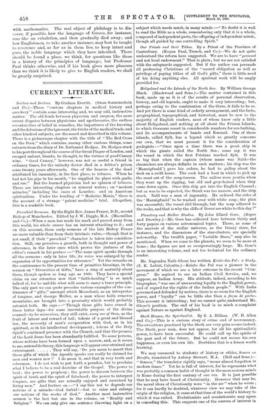Parochial Sermons. By the Right Rev. James Fraser, D.D., second
Bishop of Manchester. Edited by J. W. Diggle, M.A. (Macmillan and Co.)—When a man has made his mark and passed away from this world, his whole career has an interest attaching to it ; and on this account, these early sermons of the late Bishop Fraser are more valuable than from their intrinsic value,—though that is not small, if their " parochial " character is taken into considera- tion. Still, one perceives a growth, both in thought and power of utterance, in the later ones which proves the justness of the editor's remark in his preface The same spirit speaks through all the sermons : only in later life, its voice was enlarged by the expansion of its opportunities for utterance." Yet the remarks on the continuance to the present time of primitive blessings, in the sermon on " Diversities of Gifts," have a ring of maturity about them, though spoken so long ago as 1860. They have a special claim on our attention now that " faith-healing " is so much talked of, for he unfolds what will seem to many a truer principle. The only part we can quote precedes various examples of the con- tinuance of " gifts," amongst which Mezzofanti, as an interpreter of tongues, and George Muller, as a man whose faith removes mountains, are brought into a proximity which would probably astonish both. He says :—" Though these gifts have ceased in these latter days—for some inscrutable purpose of the divine counsel—to be miraculous, they still exist, every one of them, as the fruit of labour and reward of toil ; tokens of a great and blessed law, the necessity of man's co-operation with God, as in his spiritual, so in his intellectual development ; tokens of the Holy Spirit's continued presence with the Church, and that the promise of the Lord Jesus has been abundantly fulfilled. To some persons, whose notions have been formed upon a narrow, and, as it seems to me, untenable theory, this language will appear over-strained and
extravagant They will say, Do you mean to assert that these gifts of which the Apostle speaks can really be claimed for men and women now ?' I do mean it, and that in very truth and soberness. I do not wish to put forth a paradox, but to proclaim what I believe to be a real doctrine of the Gospel. The power to heal ; the power to prophesy ; the power to discern between the spirit of truth and the spirit of falsehood; the power to interpret tongues, are gifts that are actually enjoyed and exercised by living men." And further on :—" I say this not to degrade our notions of a miracle—God forbid !—but to raise and enlarge our notions of the works of God." Another most instructive sermon is the last but one in the volume, on " Reality and Religion." We can only give one sentence throwing light on a
subject which needs much, in many minds :—" No doubt it is well to read the Bible as a whole, remembering only that it is a whole, composed of independent parts, the offspring of independent minds, though all guided by one controlling Spirit."


















































 Previous page
Previous page